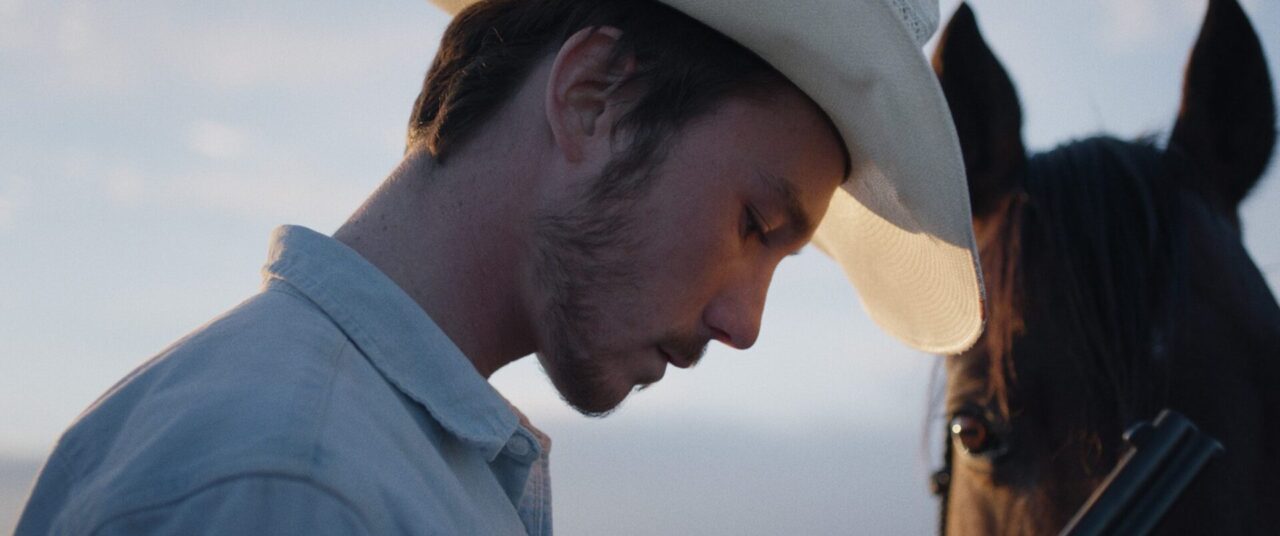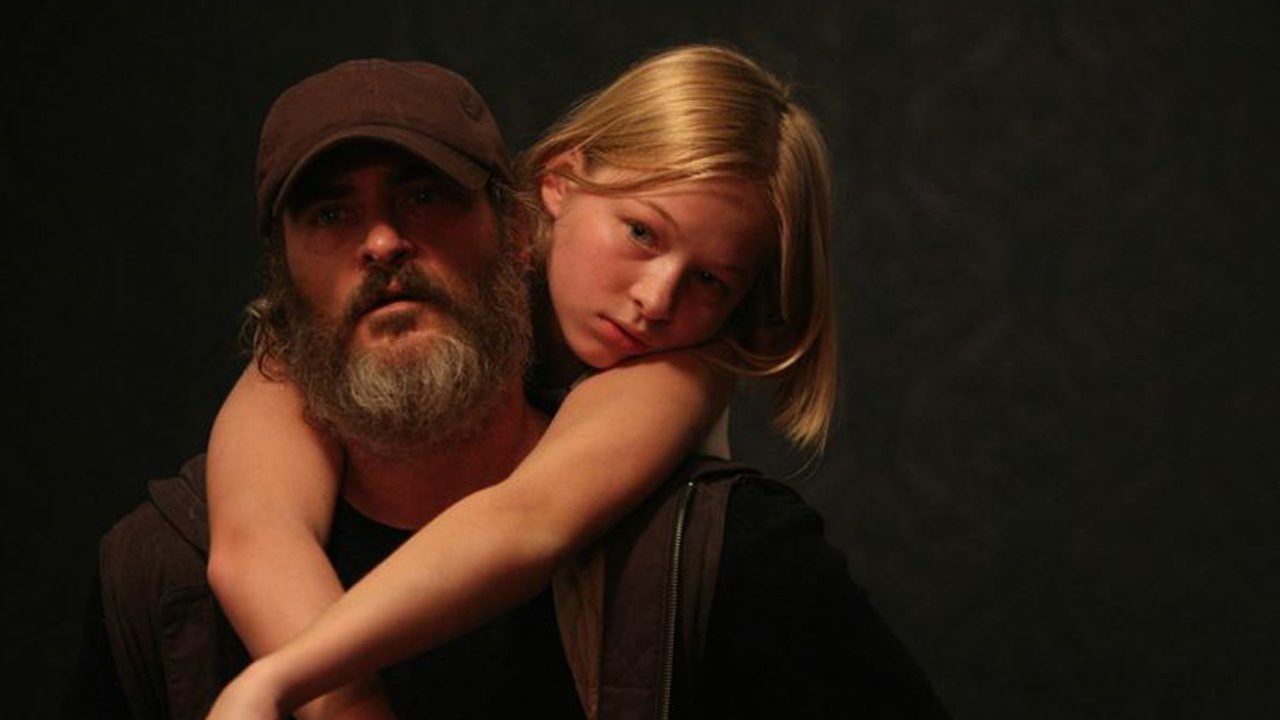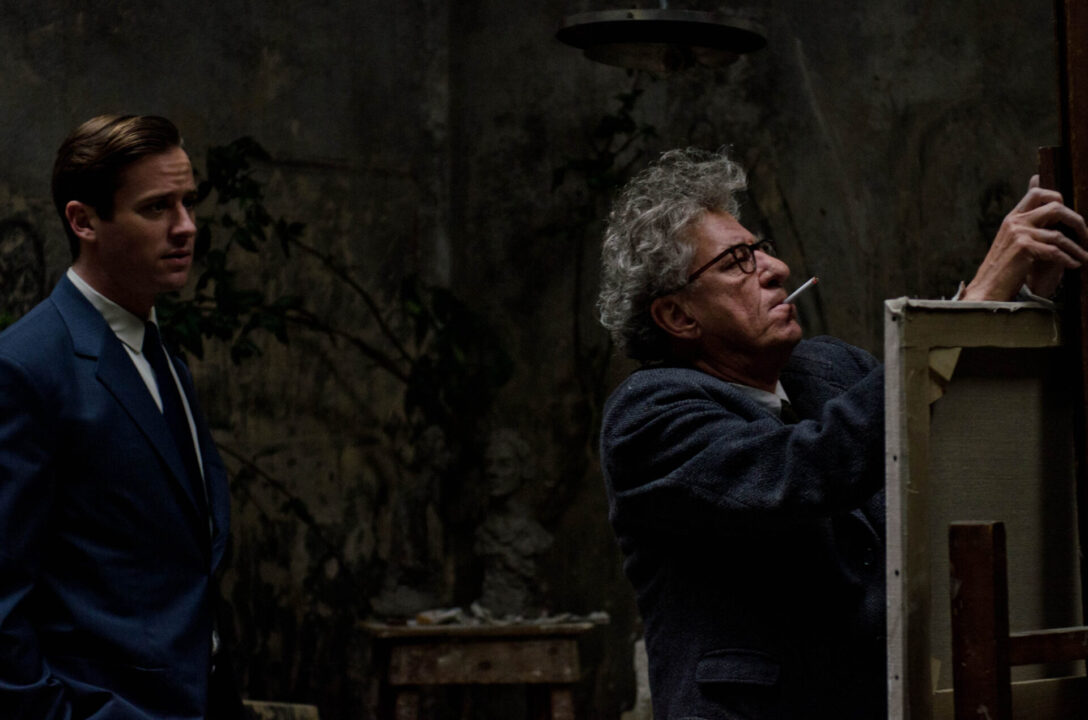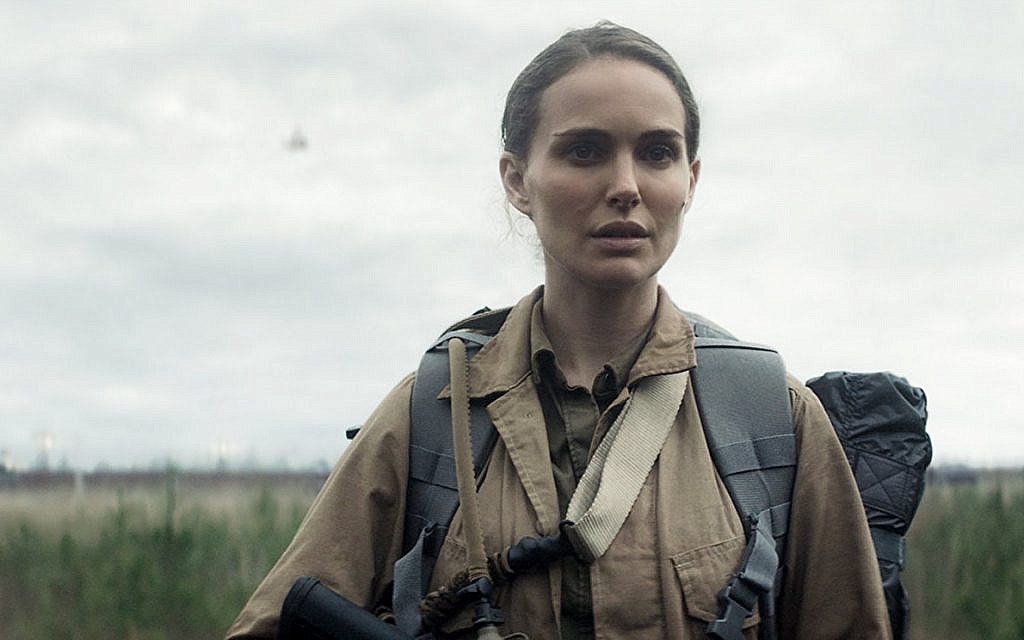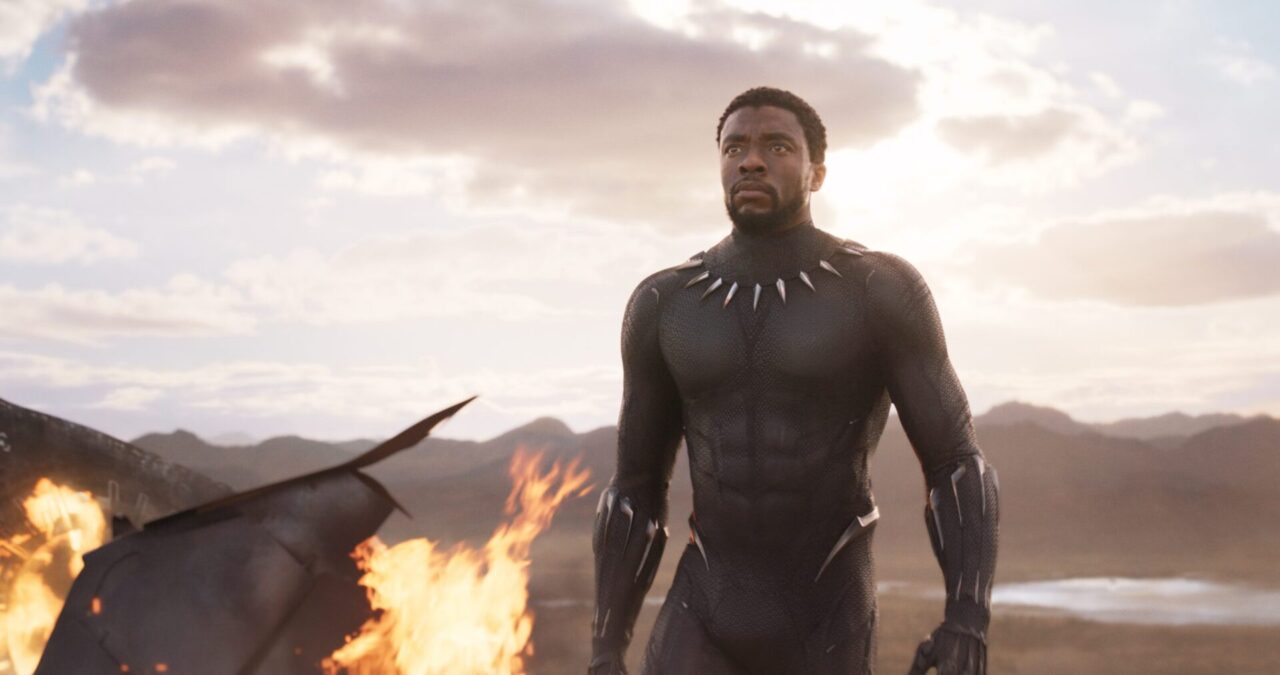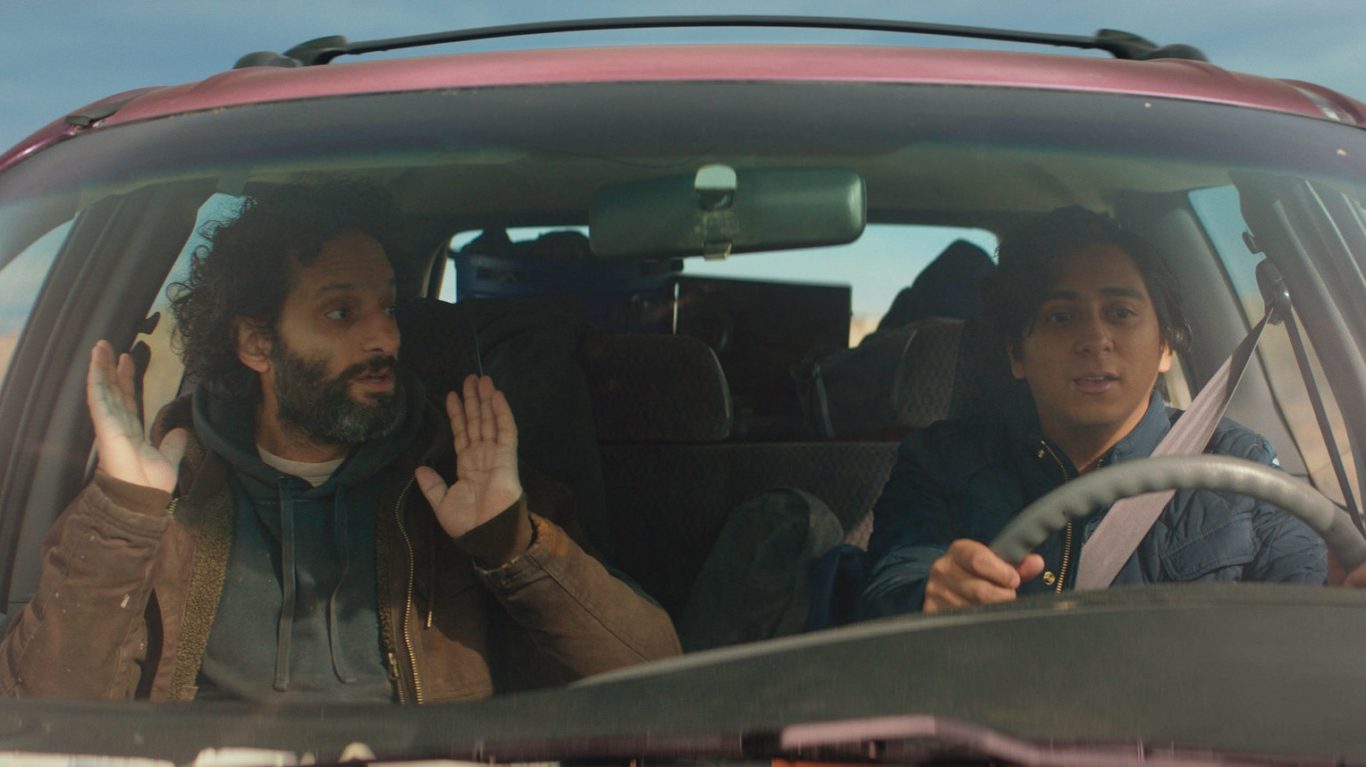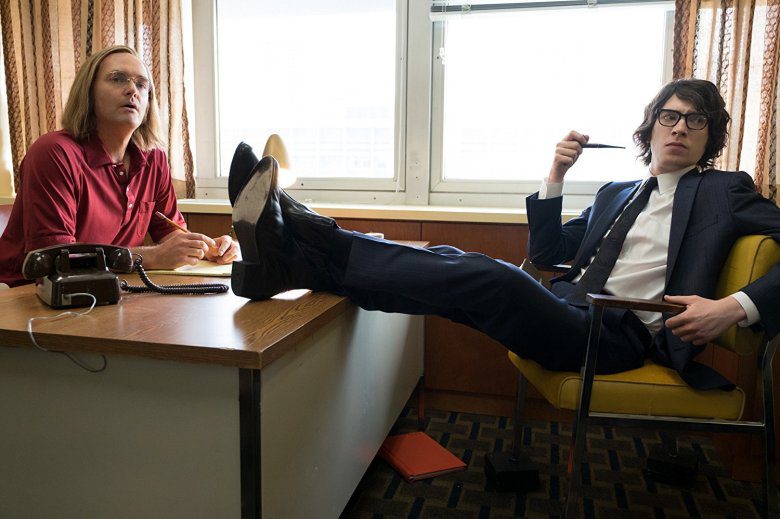'The Rider' Review: A Meditative and Moving Look at Americana
Tales of Americana rodeo cowboys –typically men – often portray a heavy helping of machismo in their identity.
But in director Chloé Zhao's second feature film, The Rider, we see a softer and more observational story of blue-collar workers who, with the use of non-actors playing fictionalized versions of themselves, reflect a larger societal observation of overcoming hardship in pursuit of a deeper passion for something as beautiful as it is dangerous and destructive.
In a simple story sense, The Rider celebrates salt of the Earth people who face hardship and does so with a real painter's eye. Brady Jandreau (who plays himself) is a man of the land – silently wise for a young man who has experienced a lot in his young life, including a debilitating post-rodeo accident that sidelines him. Brady is also a man of grit – we don't see the accident, but we do see him removing staples from his head before putting on his cowboy hat. The film follows Brady as he attempts to literally “get back on the horse” which is such a big part of his small-town life.
Zhao captures an authenticity to a part of this American character and life that loosely fictionalizes a narrative that cannot be faked with very masterful observation and understanding of these people and their lives.
The Rider goes further in painting a larger image of the hardships that Brady faces, as Zhao portrays Brady’s life with a single father, whose drinking means the rent doesn't get paid and threatens the stability of him having to also raise a developmentally disabled younger sister. Here, Zhao shows that he has more in his life that he must tame. These storylines are even more powerful when you learn that Chloé Zhao uses non-actors to play these characters, essentially versions of themselves, including his aforementioned father and sister as well as another rodeo cowboy who is a full paraplegic, to stunning effect.
At the center of the story is newcomer Brady Jandreau who along with the cast doesn't so much perform as he does live his everyday life and express his very real feelings. Zhao captures an authenticity to a part of this American character and life that loosely fictionalizes a narrative that cannot be faked with very masterful observation and understanding of these people and their lives. The Rider is one of the most unique and moving viewing experiences I've seen in quite some time. It's largely a meditative film, which means that it requires you to watch with patience. Like Darren Aronofsky’s The Wrestler, starring Mickey Rourke as a professional wrestler on the brink of retirement, The Rider shows the blue-collar workers who follow a career and passion to a detrimental degree. It will reinvigorate your love for your passions and show what meaning we find in life when confronted with hardship.
'The Rider' is rated R for language and drug use. 104 minutes. Now playing at The Landmark.
https://www.youtube.com/watch?v=AlrWRttLTkg
'You Were Never Really Here' Review: Joaquin Phoenix is a Brutal Contract Killer
Lynne Ramsay is in the driver's seat of ass-kicking arthouse films, injecting another strain of sadism into the genre that shows the depravity of human capabilities and the redemption in spite of it.
The life of the contract killer requires control in the midst of chaos, as having full control over any situation is what keeps you alive. Now, throw in the unaccounted variable of companionship, and this contingency becomes a vulnerability and jeopardizing to one's life. This is the synopsis of the new movie You Were Never Really Here.
You Were Never Really Here is the story of a buy-for-hire killer, Joe (Joaquin Phoenix), who lives a life of dark solace in modern day New York City. A burly bear of a man, Joe is silent and consumed in his own thoughts, blending into the background of normal daylight hours before operating in the shadows of his nighttime life as a monastic mercenary. And how easy it would be to live this lifestyle, except Joe must care for his aging mother (Judith Roberts), whose home he returns to between jobs to tend to her in her declining mental state. One day, a new job pops up – to locate the daughter of a high-profile Senator (Alex Manette) – except finding the girl, Nina (Ekaterina Samsonov), doesn't mean the end of the job. Joe soon finds that he's waded into a criminal underworld of child sex trafficking coordinated at the highest levels. When the job goes south, Joe must decide whether to live a lone wolf life or to fight for her safety, which threatens everyone's survival, in his most compromised, uncontrolled state.
The pairing of the film's director, Lynne Ramsay, and Joaquin Phoenix, artists who don't so much as turn a blind eye to the heinous and horrific parts of the human psyche as much as they full-tilt bulldoze towards it, makes for an electrifying experience. As the grizzly-bearded and barrel-chested Joe, Phoenix delivers another stunning performance in a role that requires him to push to the fringes of human behavior. Playing a muscly heat-seeking missile during the film's action scenes, Phoenix also delivers in the moments of mental anguish in which Joe stows away in the closet of his childhood home and wraps a plastic bag over his head to re-live moments of childhood trauma to queasy effect.
The pairing of the film's director, Lynne Ramsay, and Joaquin Phoenix, artists who don't so much as turn a blind eye to the heinous and horrific parts of the human psyche as much as they full-tilt bulldoze towards it, makes for an electrifying experience.
The theme of control is something that Ramsay has become acclaimed for mastering in her movies. She pushes audiences past the limits of their comfort zone to show the depths of wickedness that humans are capable of, as 2011's We Need to Talk About Kevin revealed the amount of sin that people commit that borders on the demonic. In You Were Never Really Here, while Ramsay again displays the depravity of human behavior, she seems more intent on exploring how people get to become broken, how innocence can become lost at the earliest of ages. When Joe sees Nina experience horrors first-hand, he realizes that the circle of abuse he endured as a child continues against all of his efforts and forces him to question: did he really save her? Was he ever really there?
While You Were Never Really Here doesn't set out to capture the poetry of We Need to Talk About Kevin, the film is still a crackling action thriller with stunning cinematography that shows artistic flourish. Ramsay and Phoenix craft a morality drama that shows how good efforts in a broken world can come up fruitless. Ramsay wades into these waters to capture this dark, depraved part of the very real human psyche while capturing this in an artfully electrifying fashion is a trip that cinephiles will love to take.
85 minutes. 'You Were Never Really Here' is rated R for strong violence, disturbing and grisly images, language, and brief nudity. In theaters April 6.
https://www.youtube.com/watch?v=R8oYYg75Qvg
'Final Portrait' Review: An Eccentric Artist is Crippled From Creating
Portraits of artists as tortured souls are generally funny for their self-imposed silliness.
However, in today's multi-cultural landscape in which the voices of a wide variety of people of color, gender, and oppression are finally having their stories told, the stories of artists – almost all (white) men – are slowly gathering louder sighs and more pronounced eye rolls.
Now, if you have the appetite for it, this idea can still be a very funny thing, as the stubbornness of an artist is still the same silliness as in all egotistical people. Certainly, this conceit is something that the brilliant Phantom Thread (my second favorite film of last year) executed exactly right. Showing Daniel Day-Lewis' couture dressmaker Reynolds Woodcock as a man who could only create his art when having breakfast totally undisturbed of toast-scraping, it flips this script on its head when it shows the utter absurdity of how fragile and irritable he is, should that sort of joke bemuse you.
The fragile and eccentric artist who is crippled from creating is also the story of Final Portrait, the debut feature film by Stanley Tucci. In Final Portrait, Tucci is similarly interested in the inner-workings of the manic mind of the tortured artist, of which the same temperament and unpredictability creates the greatest of masterpieces as well as stifles the creation of art. This study is found in the real-life story of a socialite – James Lord (Armie Hammer) – who agrees to sit for a portrait to be done by the legendary Swiss artist Alberto Giacometti (Geoffrey Rush). The joke of the movie – which also hinders the film's pacing – is that what was estimated to be an afternoon's worth of sitting ends up turning into days, which turns into weeks, of Lord waiting for Giacometti to do more than a few brush strokes at a time, or glob over days of work and re-start.
Tucci is similarly interested in the inner-workings of the manic mind of the tortured artist, of which the same temperament and unpredictability creates the greatest of masterpieces as well as stifles the creation of art.
One learns quickly that art isn't in the final product, but in the process. Or at least one learns that's what Tucci is interested in. As James Lord tells it – in sporadic voiceover narration that resembles a fascination to the mysterious mythological man like Nick in The Great Gatsby – he arrives at Giacometti's studio day after day, only to join the artist on his tangents of frustration or going out to get drinks and women (Lord doesn't partake, it's hinted that he's already spoken for by a man back home).
Hammer is polished and handsome but plays a toothless version of what his Winklevoss character might have been had he been entirely prep-school than bully. He does lend a soft and selfless performance, allowing Geoffrey Rush to own the movie as a chain-smoking and wild-mannered artist. Rush, even though his performance is all bravado and a hard act to maintain from start to finish, is captivating.
Ultimately, Final Portrait is just like its story of a temperamental and exacting artist. Tucci's writer/director debut is a noble journey of exploration that, after all of the time that was put into it, is unfortunately unfruitful.
90 minutes. Final Portrait is rated R for language, some sexual references, and nudity. Now playing at select Laemmle Theaters.
https://www.youtube.com/watch?v=sRsiW5c29Sk
'Isle of Dogs' is a Lovingly Crafted Doggy Tale of Pure Delight
Is there anyone who could transition from live-action filmmaking to stop-motion animation as gloriously as the wonderful Wes Anderson?
No. Unsurprisingly, the attention that Anderson gives to the tiniest of aesthetic details, as seen in now-modern classics such as The Royal Tenenbaums and Moonrise Kingdom, makes his natural tinkerer sensibilities only logical for the stop-motion medium. In his latest feature film, Isle of Dogs (in theaters today), we see the director at his best – crafting a storybook adventure that distills the essence of delight into a small-scale canine and kiddie-friendly epic.
Set in a fictional near-future Japan, Isle of Dogs (say it fast for an added treat) tells the story of a Japanese nation under siege by a dog epidemic known as "snout fever." This brings about the rise of fear-mongering Mayor Kobayashi (voiced by Kunichi Nomura) who sets out to banish all dogs, forcing them to live out the rest of their numbered days in exile on Trash Island. Of course, this premise is a not-so-veiled political commentary about demagoguery, but with Anderson's trademark wry and winking humor at play, the whole thing is hilariously satirized and maintains a sentimental heart.
Against this backdrop, the young Akira (Koyu Rankin) sets out to find his lost dog on Trash Island. This leads him to rest of the heroes in the story: the famished and sickly Rex (Edward Norton), Duke (Jeff Goldblum), Boss (Bill Murray) and King (Bob Balaban) who all agree to help the young boy find his dog, Spots (Liev Schreiber). However, it's the pack's leader and single stray of the group, Chief (Bryan Cranston), who is hesitant to help Akira because of his "obey no man" attitude. Ultimately outvoted (the dogs always put group decisions up to a democratic vote), Chief reluctantly accompanies the fool-hearty dogs – and human – on their odyssey.
It's a magical thing to watch these animated dogs come to life on the big screen. Anderson's skilled animators and voice cast breathe magical humor and humanness all their own into these dogs, making you remember that every movement was made with the faintest of touches. Through a long journey that sees Akira and the dogs evade military forces in the form of robotic dog hunters, it all leads to a climactic end in which, with the help of pro-dog resistance fighters – including an outspoken American foreign exchange student (voiced by Greta Gerwig) – the dogs must fight for survival, lest man's best friend be eradicated from civilization.
Anderson's youthfully defiant films speak to our innermost selves.
The story and staging are all very refined and tight, which makes sense, as this isn't Anderson’s first foray into stop-motion animation. His 2009 outing, Fantastic Mr. Fox, saw the auteur first explore the stop-motion medium by bringing the seminal children’s book to the big screen. While it was acclaimed for all of the right reasons, it also felt like a director doing a one-off homage to a beloved source material (P.T. Anderson's under-appreciated Inherent Vice feels like a similarly executed auteurist exercise). But with Isle of Dogs, we get an original story from Anderson and collaborators Roman Coppola, Jason Schwartzman, and Kunichi Nomura, and feels like an even tighter, more coherent story that paces fantastically all it's own.
And while Anderson has literally shrunken down the size of the production for Isle of Dogs, it should be noted that he expands in his exploration of a new cultural landscape and continent, bringing every bit of Japanese culture and detail to life in his storybook world. And no matter the size, whether as grand as The Grand Budapest Hotel or as intimate as Isle of Dogs, one thing always remains the same: Anderson's films are about a spirit of adolescence that stands out, or up, to a larger, more absurd, adult world. Anderson's youthfully defiant films speak to our innermost selves.
So, where does Isle of Dogs rank next to the rest of Anderson's other brilliant works? To put the finest point on it, Isle of Dogs is his most delightful work. I loved every minute and moment of this film, and it's not hard to do exactly that. How Anderson and company are able to make a movie so funny with the most minute gestures, glances, and moments is something that will have audiences wagging their tails over in pure joy.
101 min. 'Isle of Dogs' is rated PG-13 for thematic elements and some violent images. In theaters this Friday.
https://www.youtube.com/watch?v=dt__kig8PVU
101 min. 'Isle of Dogs' is rated PG-13 for thematic elements and some violent images. In theaters this Friday.
'Annihilation' Review: A Sprawling Sci-Fi That Explores Humanity From the Cellular Level
It's fun when sci-fi is combined with grandly ambitious ideas – here, director Alex Garland explores what it means to be human by understanding our own cellular division at the most microscopic level – but Annihilation is less of a coherent vision then it is a familiar flick of a fight-to-survive with some psychedelic flair.
In Annihilation, the threat to humanity isn't so much that of humans being wiped from the face of the Earth by extraterrestrials, but rather, extinction through mutations to DNA in which humans either cross-evolve with other life-forms, or be killed by those very creations. This wildly ambitious and heavily conceptual sci-fi flick begins with a crash course in explaining cellular make-up at its most basic level: as taught to us in a collegiate course setting by biologist Lena (Natalie Portman). She explains how the activity of endless division within the body – one becoming two, two becoming four, and so on and so forth – shows a fundamental error in our own evolution, in that we are programmed to divide rather than unify.
It's a somewhat cynical premise, but as Lena's military husband Kane (Oscar Isaac) has been gone for a full year since being deployed on a covert mission, we concede that Lena has rightfully become hardened. That is, until Kane stumbles his way through the front door of their home one unexpected night, to Lena's shock. From a military pop-up base that she and her husband are immediately whisked away to, Lena is informed by Dr. Ventress (Jennifer Jason Leigh) that her husband was part of an infantry unit called upon to enter a mysterious site called "The Shimmer." At this location, evolution of all living matter refracts up to its bubbly orb and then back down on itself, making for crazy cross-pollinating life forms that include beautiful floral families and mutated killer bears. With Kane lying comatose, Lena decides to join a new unit who is prepping to enter The Shimmer to discover its origin. Of course, early scientific study turns into an all-out fight for survival as the team soon learns what threatens them inside.
While it strives to blend action and philosophy, 'Annihilation' is more exciting for the ideas that it attempts to bring forward rather than a complete, coherent story.
We've seen this sort of alien expedition mission movie before in films like Prometheus and even in Arrival, but this cast brings another dimension to this film. Natalie Portman returns from her Oscar-winning turn in 2016's Jackie to re-assert herself as a big-screen action star, and while it may be more likely to believe Lena is an academic biologist rather then seven-year army veteran, Jennifer Jason Leigh as Dr. Ventress is commanding all the same, lending more pathos then bravado in her position of power. And one of the most welcomed points of the movie is the all-female crew that moves into The Shimmer, comprised of Anya (Gina Rodriguez), Josie (Tessa Thompson), and Cass (Tuva Novotny). Writer and director Alex Garland once again brings brainy and ambitious ideas to the big screen, but whereas the power of his first feature film Ex Machina was in its intimacy and single location, the world of Annihilation is a world that requires great canvases, and the story is spread too thin to execute a coherent story.
Director Alex Garland (Ex Machina) is among the more ambitious sci-fi storytellers to bring challenging material to the big screen, and Annihilation offers a closer reading for those who read into it. The fact that teams of soldiers continue to enter The Shimmer, knowing that nobody has come back alive (the exception being a comatose Kane) is actually a comment about the flaw in human design. Lena also discovers a shared characteristic in the crew: they are all escaping vices and addictions that await them at home. Garland makes the connection that perhaps humans are destined to be self-destructive creatures.
Of course, this is a deeper reading that may penetrate audiences, and the rest of the movie offers enough serious and interesting world-building that it becomes a unique movie-watching experience. Annihilation ends with a wordless sequence that is stirring and captivating. While Garland expands on bringing his philosophy into action and grander visual storytelling, Annihilation is ultimately more exciting for the ideas that it brings forward than its execution.
115 min. 'Annihilation' is rated R for violence, bloody images, language and some sexuality. Now playing.
https://www.youtube.com/watch?v=89OP78l9oF0
'Black Panther' Review: A New Kind of Super Hero Roars to the Big Screen
Black Panther, the latest standalone superhero movie from the Marvel cinematic universe, roared to a record-shattering $218 million U.S. debut over this past Presidents' Day weekend, making it the highest debut ever for a February film and fifth highest opening of all time.
Further positive word of mouth reviews are sure to continue to make this movie the first must-see movie event of the year, and for good reason: Black Panther is a vibrant and exciting film that has re-energized the superhero genre and feels vital to these times.
For those who have been keeping up with the entirety of these Marvel movies, Prince T'Challa aka Black Panther (Chadwick Boseman) was first seen in 2016's Captain America: Civil War when he witnessed the passing of his father at his feet. Black Panther sees T'Challa returning home after the events of Civil War to the African nation of Wakanda to succeed the throne as king and rule over his people as the Black Panther. Holding court over his inner circle of royals are W'kabi (Daniel Kaluuya) and a group of strong women, including mother Ramonda (Angela Basset), Wakandan guard Okoye (Danai Gurira) and sister Shuri (Letitia Wright), who give council to an untested T'Challa in which he finds himself with the new responsibility of governing over the people in this new position.
T'Challa finds that it's also up to him to keep his country flourishing, which it has done for generations by staying hidden away from the rest of the world while mining a rare resource called vibranium, an element stronger than steel that the Wakandans put into everything from their buildings to their clothes, and what his sister Shuri makes the Black Panther costume and gadgets out of. But little does T'Challa know that vibranium is also being coveted by enemies abroad, including Klaue (Andy Serkis) and the American Erik Killmonger (Michael B. Jordan). It's Killmonger who we learn has more than a bone to pick with T'Challa who, when he makes a dramatic crash landing into Wakanda, challenges T'Challa for the throne and for control of how to lead the nation forward– in which less then peaceful results loom large.
Seeing people of color in major roles like this only serve to further empower audiences of all kinds who have been underrepresented until now. And this might be 'Black Panther's' greatest superhuman feat.
While Black Panther is the latest superhero flick sandwiched between the rest of the Marvel catalog, it's not your traditional superhero movie. First of all, there's a new visual identity that director Ryan Coogler (Fruitvale Station, Creed) injects into the movie that keeps the whole thing lively and excitable. And largely, there is a mythos to Black Panther that makes it feel even weightier next to its contemporaries. Scenes of T'Challa connecting with his ancestors for wisdom and guidance while he searches for his place and destiny is a drama more akin to Shakespeare than Superman.
And while it's all still pop entertainment escapism, it's undeniable that there is a political and sociological relevancy given the times that we're living in. Scenes in which King T'Challa is confronted with how to rule over Wakanda – whether to provide the knowledge and technology of his country with the rest of the world or hold onto them for his country's own stability – is a discourse especially prescient to today's national conversation.
Black Panther is also the face of a new kind of hero that's largely been missing from superhero movies for quite some time. Having embodied some of history's most important African American figures, such as Jackie Robinson and Thurgood Marshall, Boseman gives an effortless grace and presence to his King-in-making Black Panther. Michael B. Jordan is a mad dog off the leash here, and other stand-out performances include Lupita N'yongo as T'Challa's love Nakia and Forest Whitaker as Zuri, who aids T'Challa. Seeing people of color in major roles like this only serve to further empower audiences of all kinds who have been underrepresented until now. And this might be Black Panther's greatest superhuman feat.
134 minutes. 'Black Panther' is rated PG-13 for prolonged sequences of action violence, and a brief rude gesture. Now playing.
https://www.youtube.com/watch?v=xjDjIWPwcPU
'The Long Dumb Road' Sundance Review: Jason Mantzoukas Makes "Dumb" Fun [WATCH]
The "buddy comedy" and "road movie" genre has always connected with audiences for the stories of personal growth that they inherently tell.
Previously comfortable or complacent characters who are met with obstacles that force them to recognize personal flaws, and by doing so grow from them, are movies that have a lot to offer audiences. Updating this template for the millennial generation, writer/director Hannah Fidell, whose last feature film was the steamy young love study 6 Years, takes this framework and adds a winning ingredient – funnyman Jason Mantzoukas as an unemployable drifter – to make the charming, delightful and heart-warming film The Long Dumb Road.
Taking his family’s mini-van across state lines to begin art school in Los Angeles, incoming freshman Nathan (Tony Revelori) expects nothing more than a nice drive where he can pull over and rattle off some photos on his film camera on his way to orientation, but plans change when his car breaks down. The first person Nathan meets is a very recently unemployed (quite literally quitting his job in hilariously theatrical fashion when we meet him) Richard (Mantzoukas), who puts the “manic” in “mechanic.” Nathan agrees to take Richard to his newly chosen destination – Las Vegas – as it's on the way to art school, and some company would be appreciated.
Nathan is an intelligent kid with his wits about him, collected and measured enough to bet that offering Richard a ride wouldn’t be a threat to him. The number of road beers and joints that Richard sparks, coupled with his overly braggadocios demeanor, only reveals his good-natured easy-goingness, something that Nathan realizes he could use a little more of in his own life. Of course, a number of not so enlightening incidents occur during the new friends’ journey through the American Southwest: an "almost" bar fight; disastrously reuniting with a lost love; overstepping boundaries with new flirty acquaintances (Taissa Farmiga, Grace Gummer), and getting set back by an old friend of Richard’s in a very inconveniencing way.
As he did in The Grand Budapest Hotel and more recently Spider-Man: Homecoming, Revolori shows that he’s able to hold his own against heavy-weight presences, but this time as just a young, earnest millennial without any character dressings. It's Mantzoukas who is the fuel of this movie, each of his impulsive and poor decisions more entertaining than the last. It’s a joy to see Mantzoukas, who always elevates any production he’s in as a supporting role, buddy up with a sort of adopted brother dynamic to play to his strengths as leading man.
Whereas the artfully-eyed yet heavy-handed 6 Years saw Fidell explore the somber notes that young people’s mutually exclusive relationships can bring, The Long Dumb Road (as can probably be inferred by its title alone) has almost one-hundred percent less seriousness in it (a final act triumph includes Mantzoukas attempting to defecate on an enemy’s lawn), and it’s all the more watchable for it. At a tight ninety minutes, The Long Dumb Road, co-written by Carson Mell, sees Fidell exploring her own new world– comedy. It is a much looser style then we’ve seen her embrace before, which reminds us that sometimes the best thing we can learn is to not take ourselves too seriously.
90 min. 'The Long Dumb Road' is not yet rated.
'A Futile and Stupid Gesture' Sundance Review: The Origin Story of the Irreverent National Lampoon Gets Its Due [WATCH]
While you've likely heard of the name National Lampoon, or may count Caddyshack or Animal House to be among your favorite movies, do you know who Doug Kenney is?
Until now, Kenney – the comedy genius who co-created National Lampoon – has remained mostly unknown, while the comedians that were launched from it (among them Bill Murray, Gilda Radner, and Chevy Chase) have come to overshadow Kenney's own fame. A new movie, A Futile and Stupid Gesture (now streaming on Netflix) highlights the life of Kenney and the wild rise of this new school of comedy. Both a silly send-up as well as a sentimental tribute, Futile is sure to delight both purist comedy nerds looking to get their history fix of the birth of National Lampoon as well as those just looking for some low-stakes laughs.
Based on the novel of the same name by Josh Karp, the story begins back in Doug's (Will Forte) undergrad years at Harvard, where he meets fellow wise-cracking slacker Henry Beard (Domhnall Gleeson). Together, the duo would create the first iteration of the Lampoon – a comedy collective that was "really just an excuse to party." It's Kenney who wants to keep the party going post-graduation, convincing the more level-headed Beard to create a national magazine of their irreverent comedy for all juveniles. As it turns out, there was a counter-culture of college-aged kids waiting to embrace a publication like this, whose shocking magazine covered politics and culture through raunchy comics and cheeky nudity.
It's around this time in the movie that we start to meet the people who would form National Lampoon's original writing staff (Thomas Lennon, Natasha Lyonne, Tony Hendra). One of the hilarious devices that A Futile and Stupid Gesture utilizes is a hilarious use of meta-awareness, especially when it comes to commenting on the actors who are playing the real-life comedians of Christmas past. "Modern Doug" (Martin Mull) – who would be Doug in "present day" if he was still alive – pops up like a one-man Greek chorus throughout the movie to explain such things as, how although he (Mull) and "Will Forte" both play iterations of Doug but look nothing alike, that that really doesn't matter because do we really even believe that Will Forte is even twenty-seven?
It's this level of self-reflexive non-seriousness that director David Wain (Wet Hot American Summer) wonderfully incorporates into the movie, which conjures the anarchic and playful spirit of the Lampoon and back into the movie itself. As a biography movie, Wain does service to both Kenney and the story by hitting every major milestone of the Lampoon's successes and wobbly setbacks, straddling the balance of funny and worry. The flighty Kenney moves on to bigger and grander ideas: a National Lampoon radio hour, which introduces new players Bill Murray (Jon Daly), John Belushi (John Gemberling) and Chevy Chase (Joel McHale), who would go on to star in such films like Animal House and Caddyshack.
It's around this time that A Futile and Stupid Gesture explores Kenney's darker period. It doesn't shy away from showing his crippling anxiety and growing competition (a certain late-night weekend sketch show is accused of stealing all of his players). Flashing back to a childhood Kenney experiencing the early death of his brother and internalizing feelings of inadequacy brought on by his demanding parents, he would battle with drug use that, while stimulating his own creativity, would eventually lead to his own demise.
But not to bring down the mood, as Wain and Kenney and the rest of his wild team would surely object to if they felt their story was getting too sentimental, adding further delight to the movie is a smattering of visual sequences in which Wain brings iconic Lampoon magazine covers to life right before our eyes. If Wain was attempting to bring the purest and most honest form of Kenney's story to life, then he wildly succeeded. If he was looking to make a silly, wacky comedy with a little bit of heart for audiences everywhere, then he made that too. With A Futile and Stupid Gesture, we finally see the merry madness that Doug Kenney went through in search of a laugh – however futile and stupid it may have been.
https://www.youtube.com/watch?v=33dztfqRu_k
101 min. 'A Futile and Stupid Gesture' is available to stream on Netflix starting this Friday, January 26th.
https://youtu.be/7HfUukHvteo

